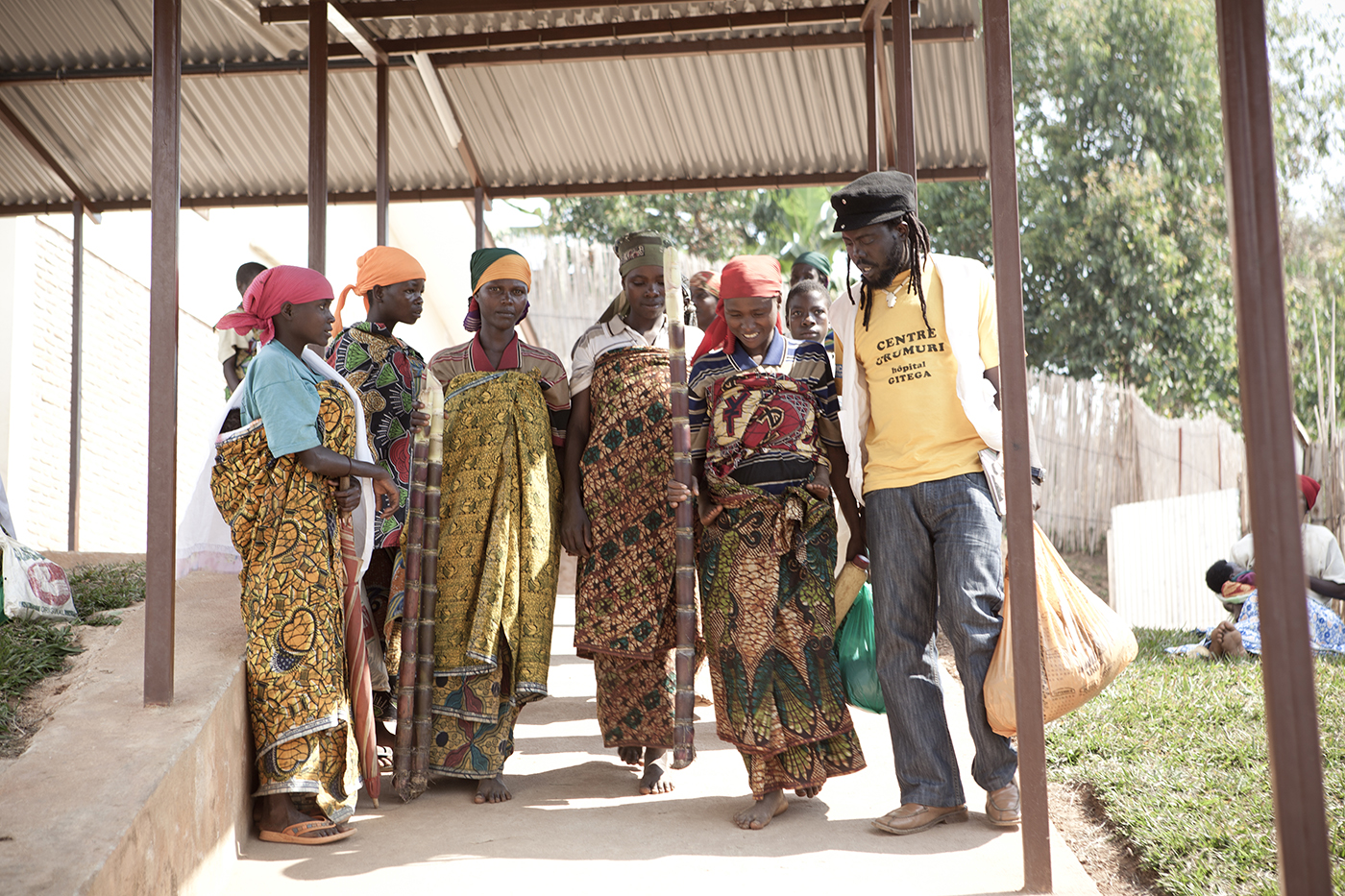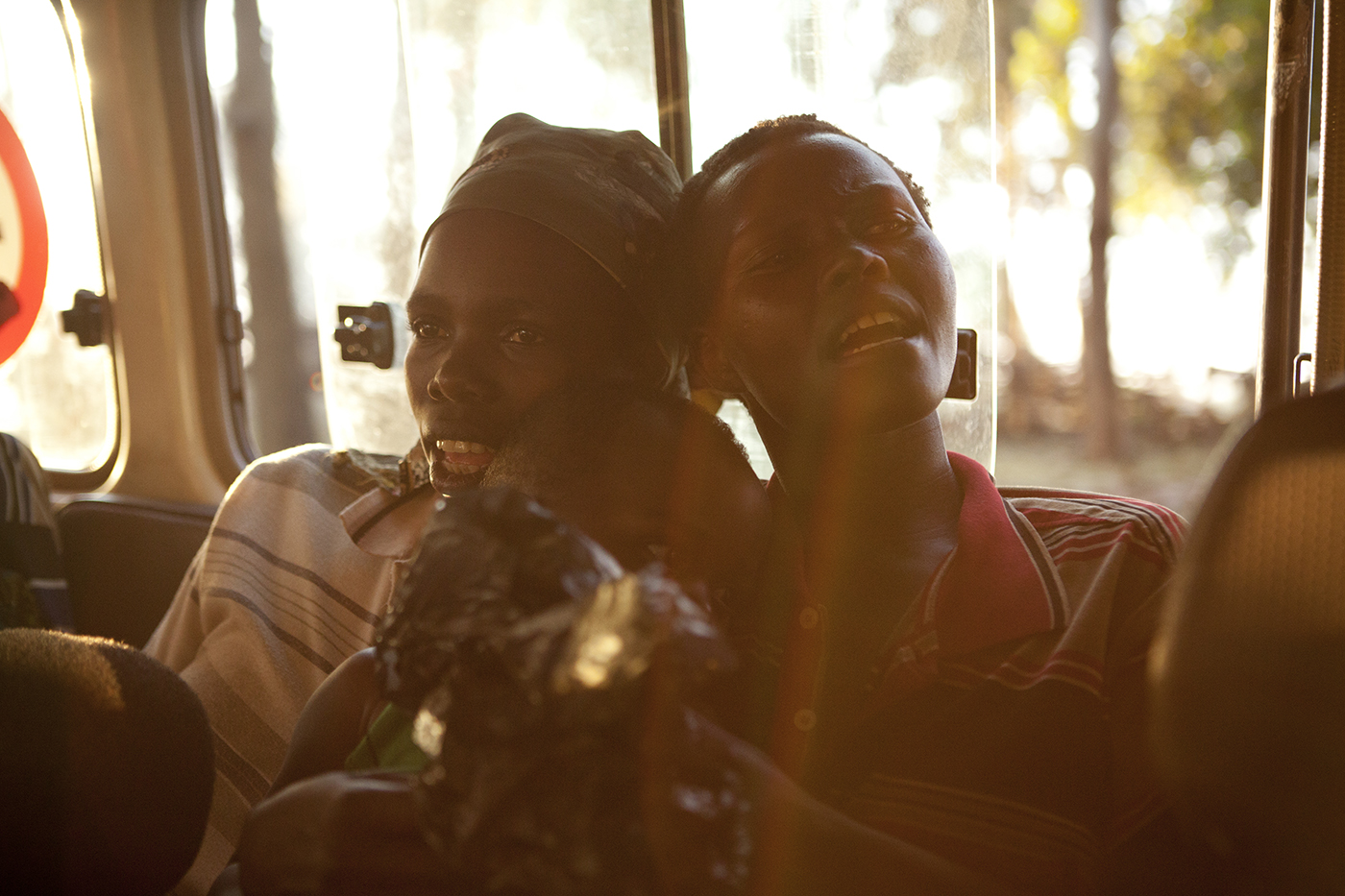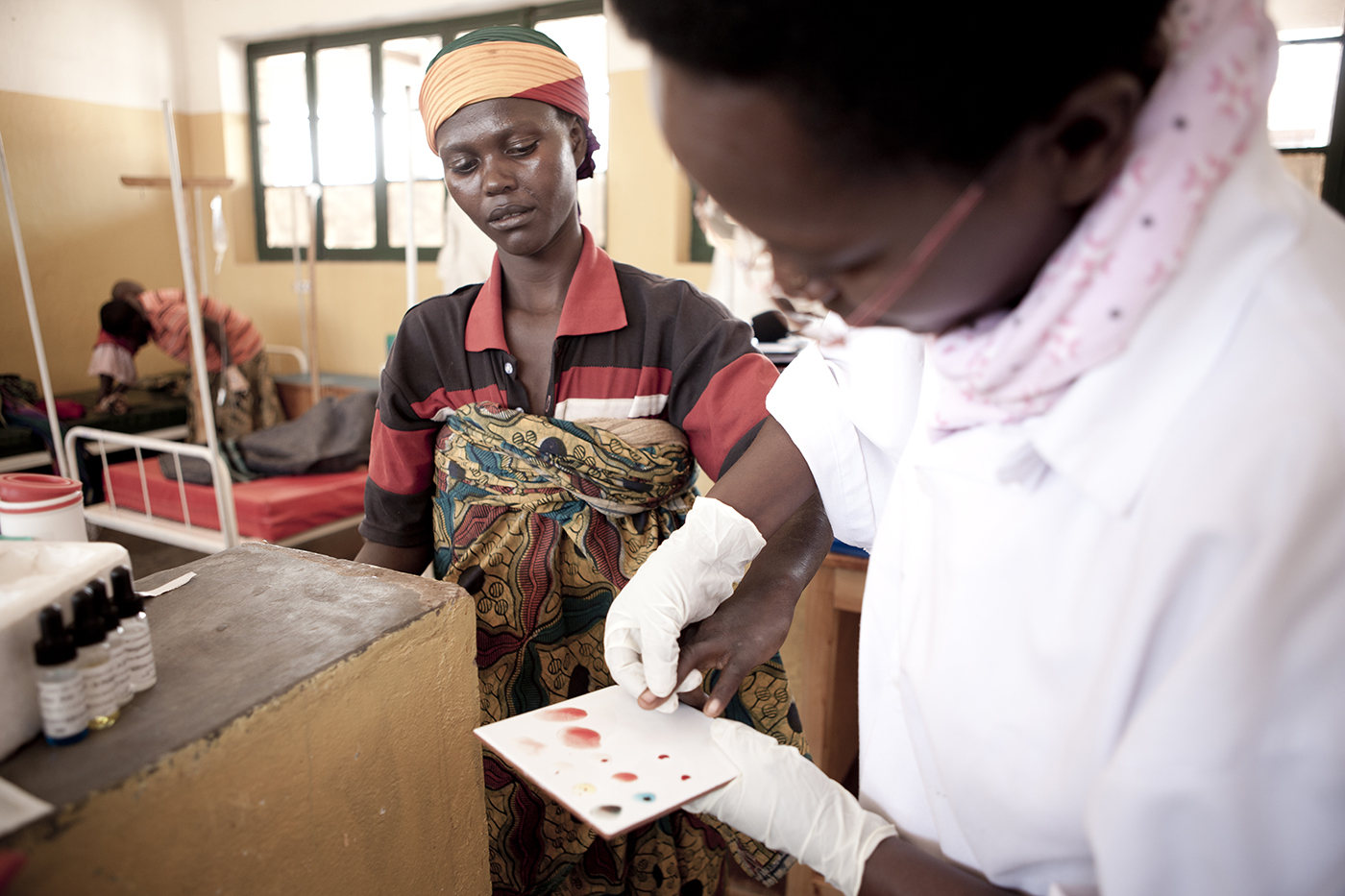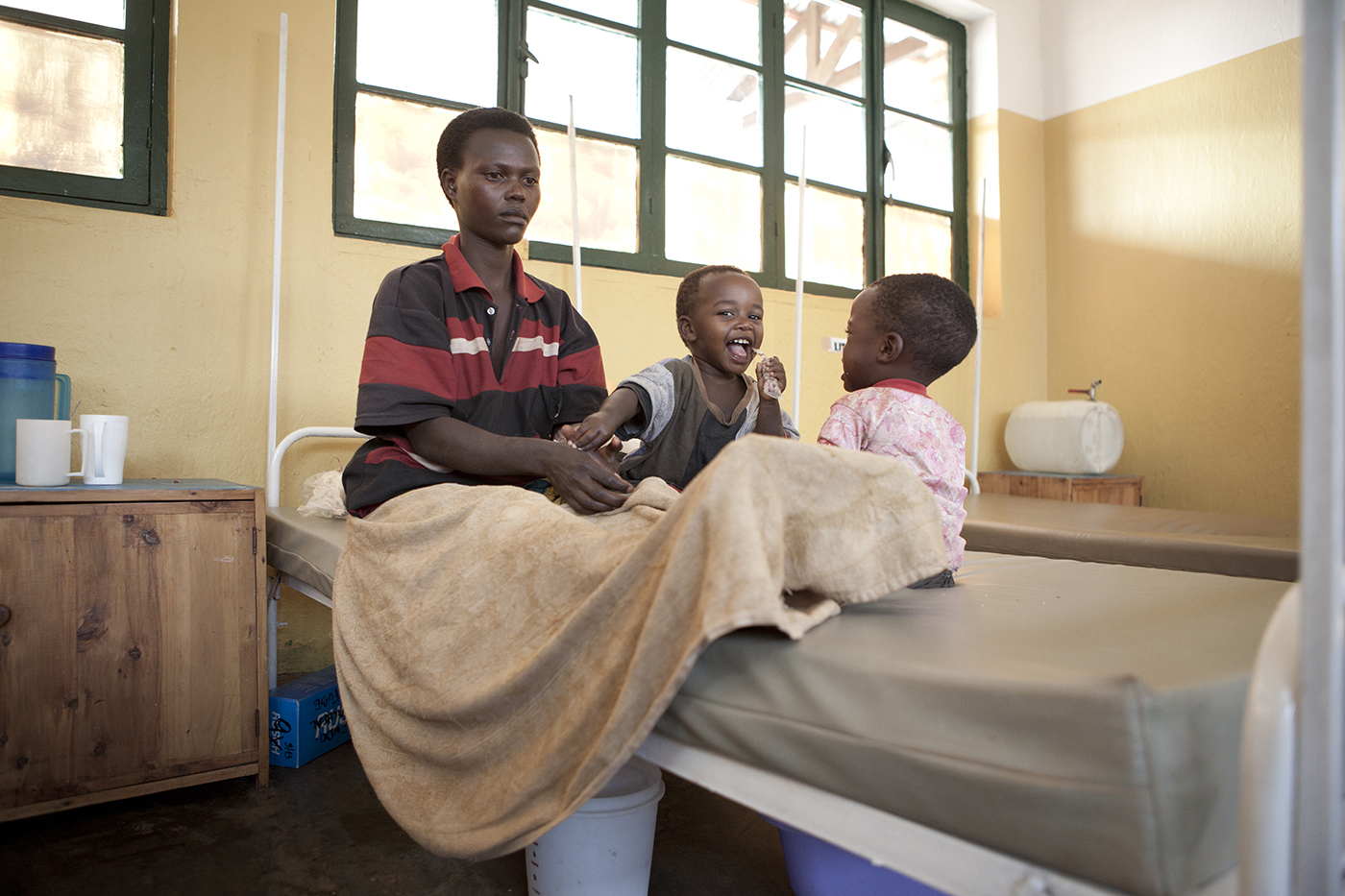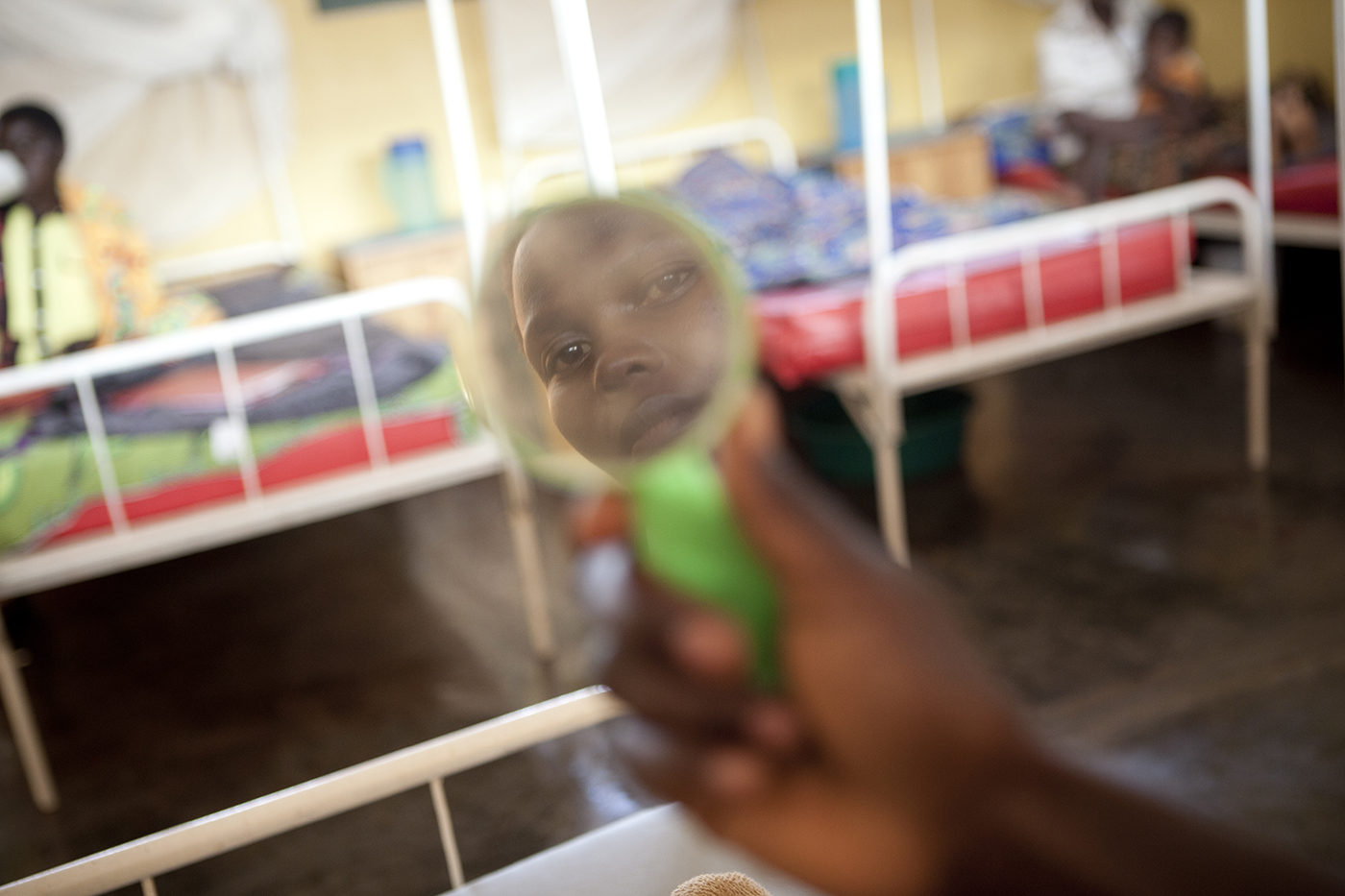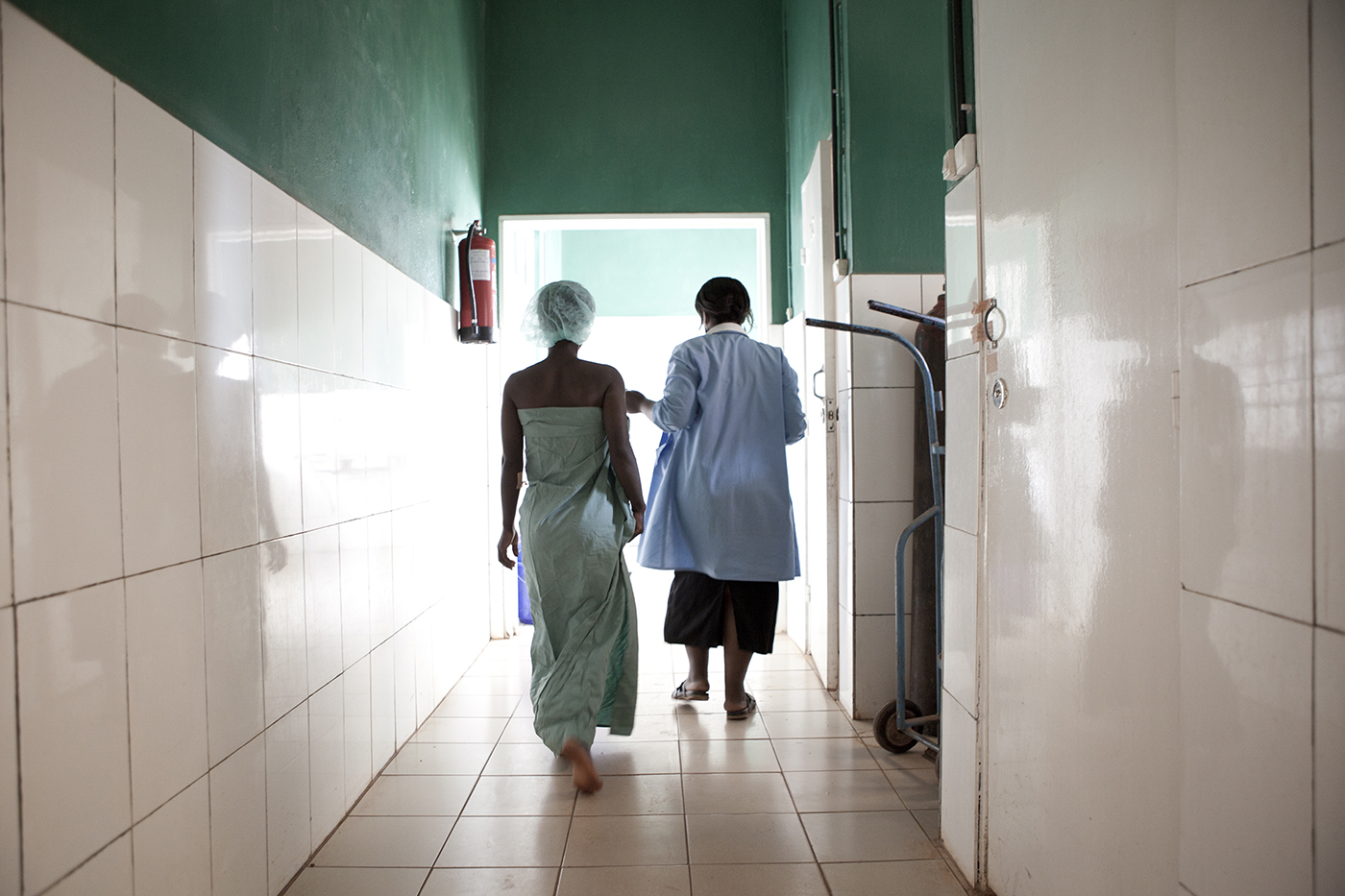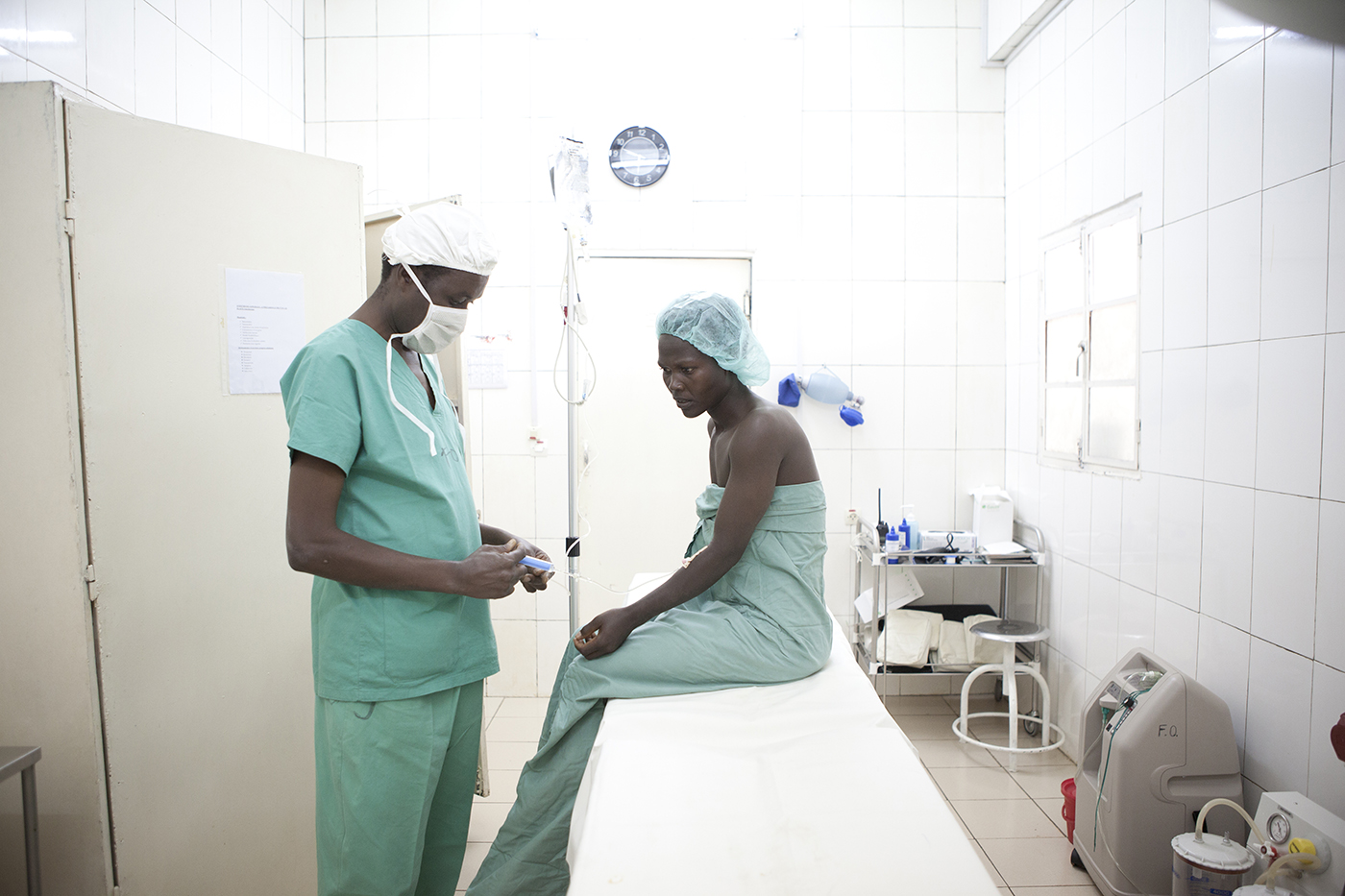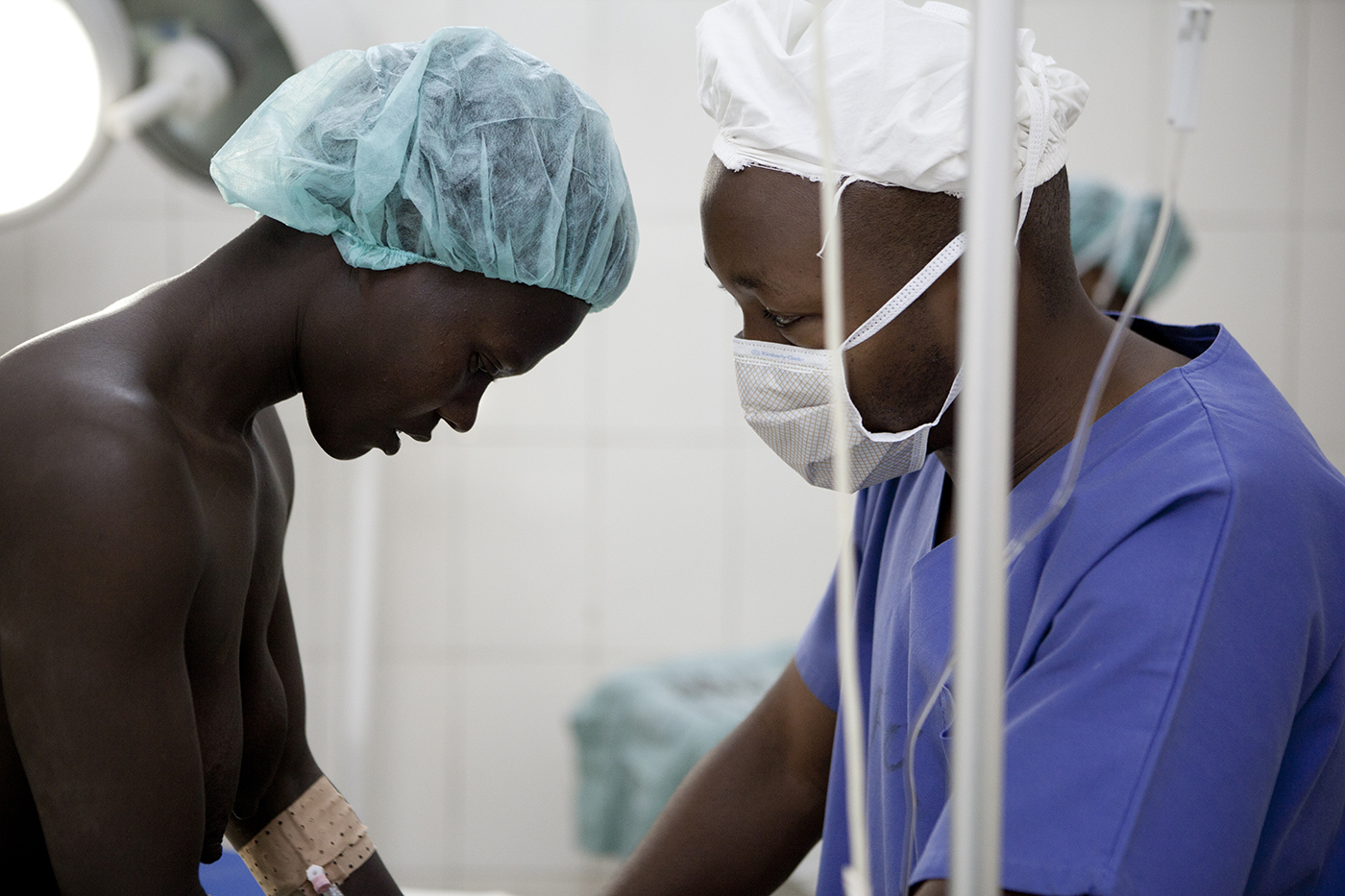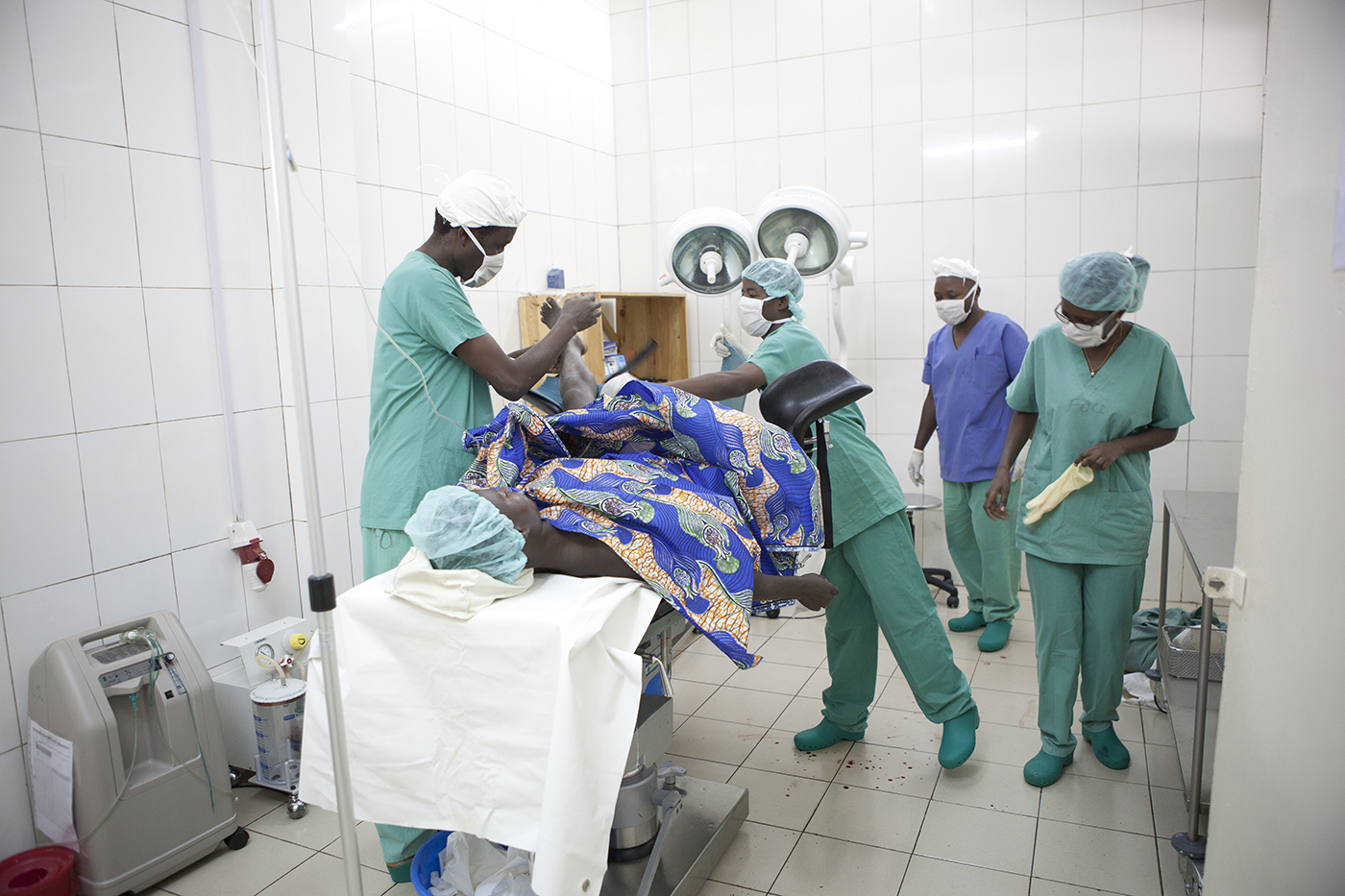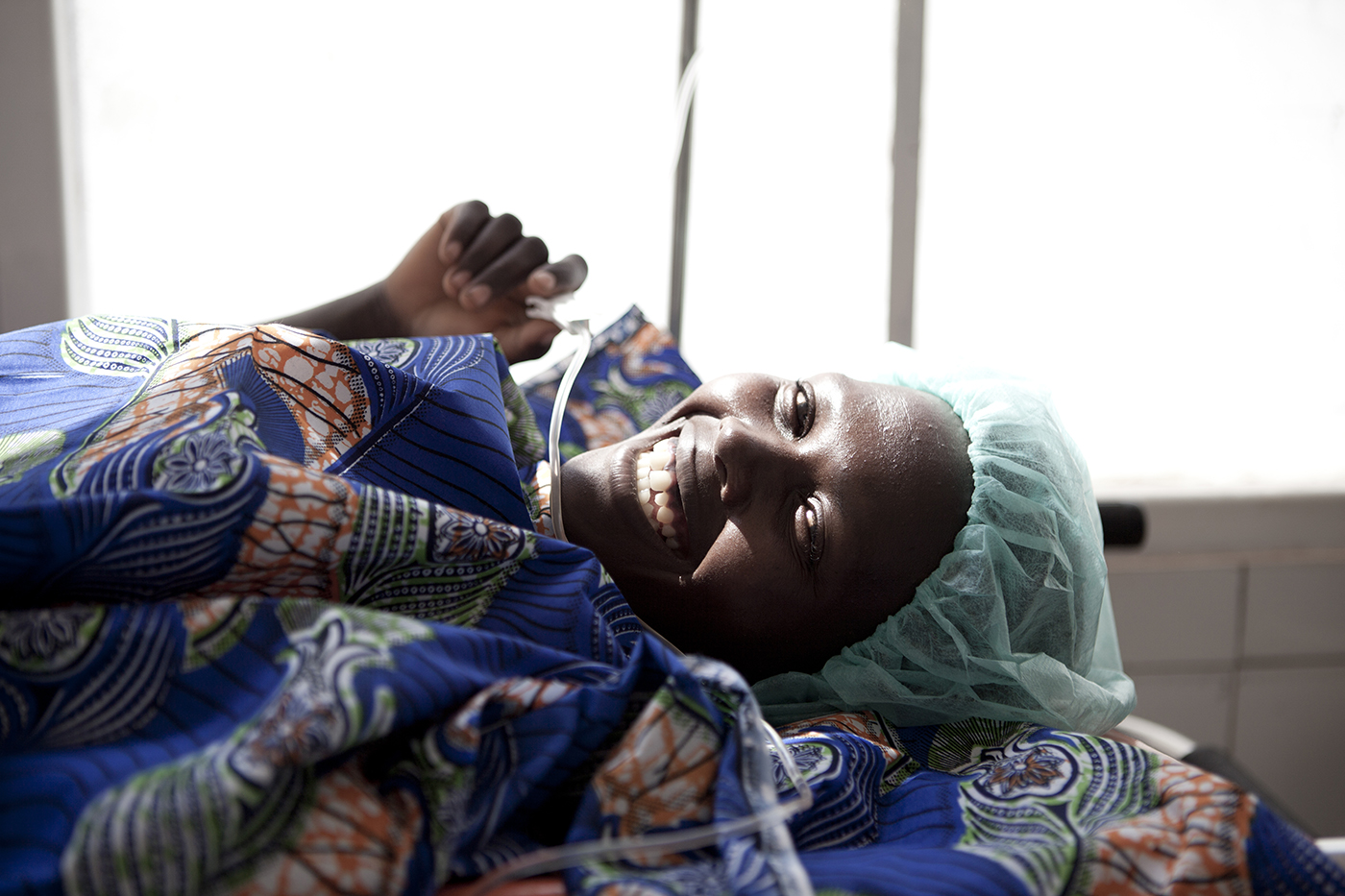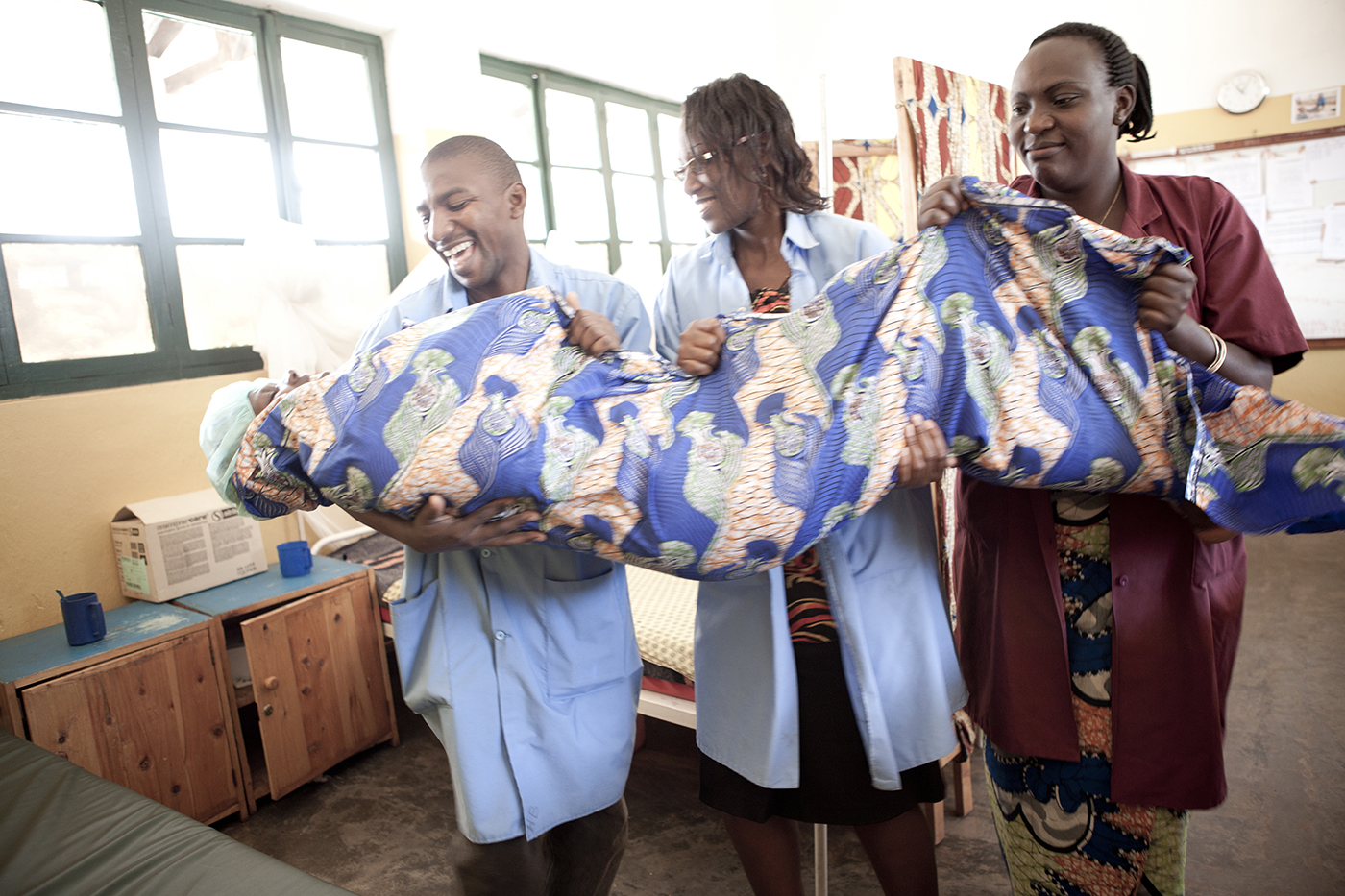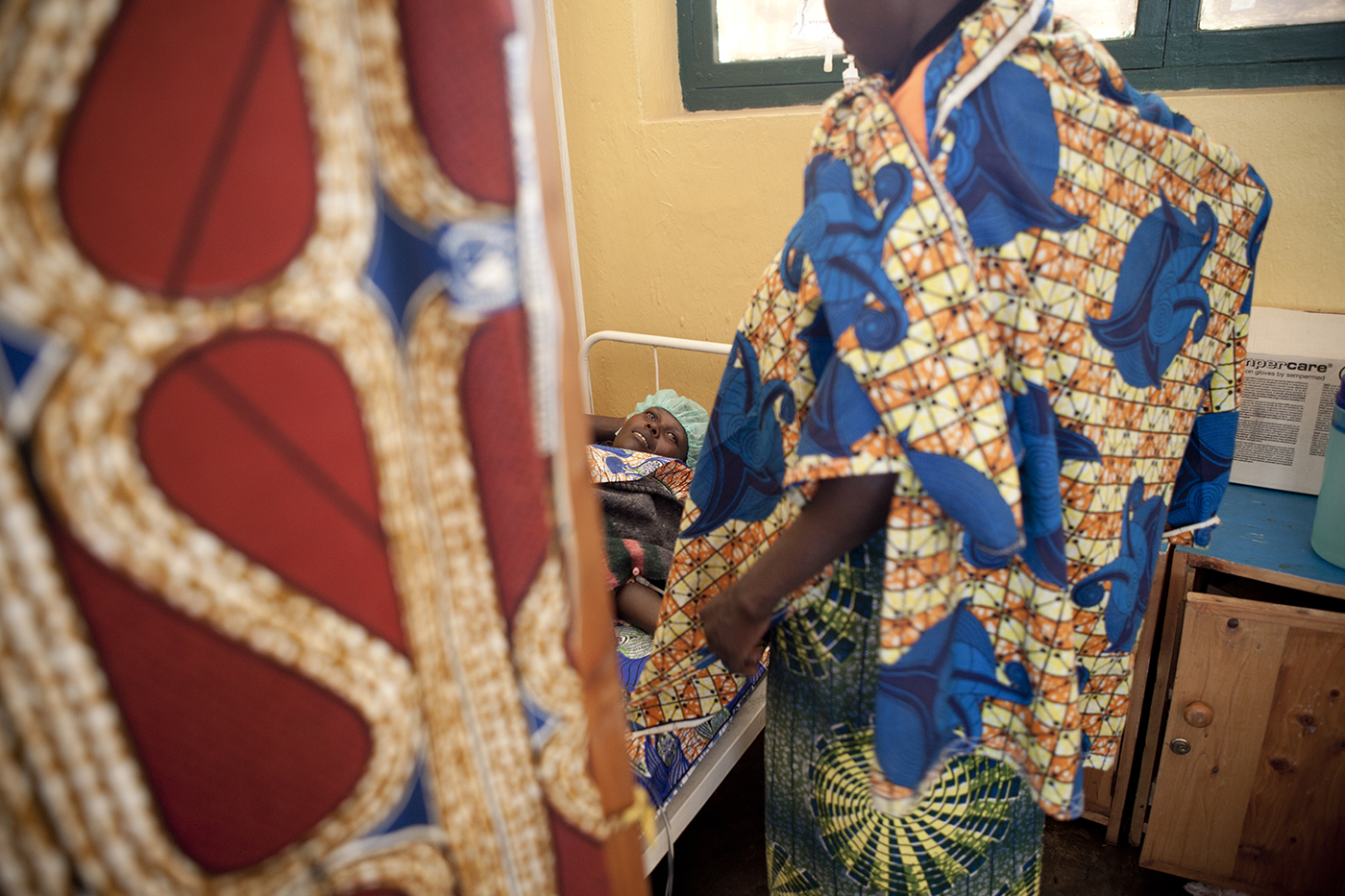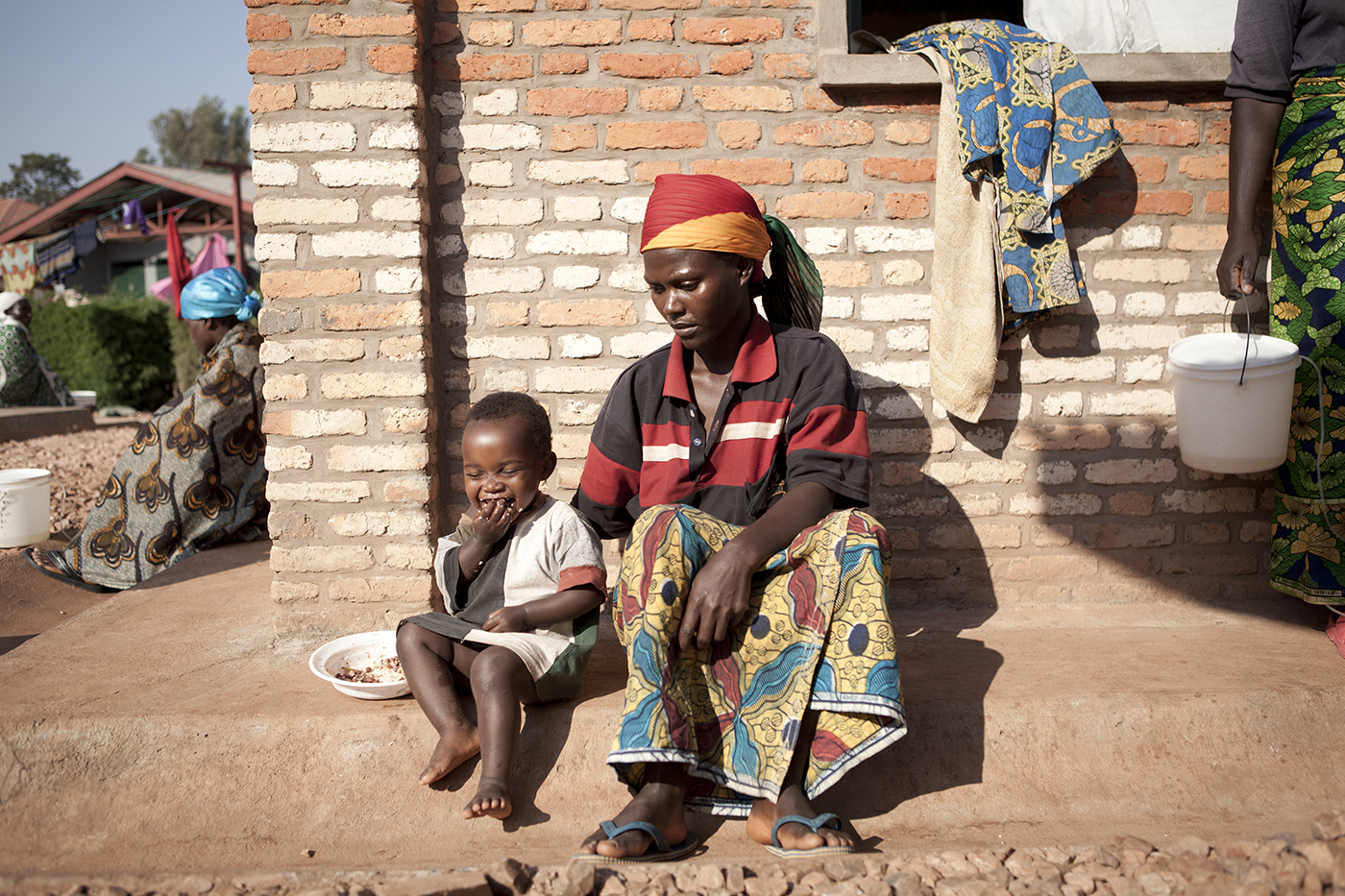A Shameful
Condition:
Obstetric Fistulas
Contributions from Michiel Lekkerkerker, MD
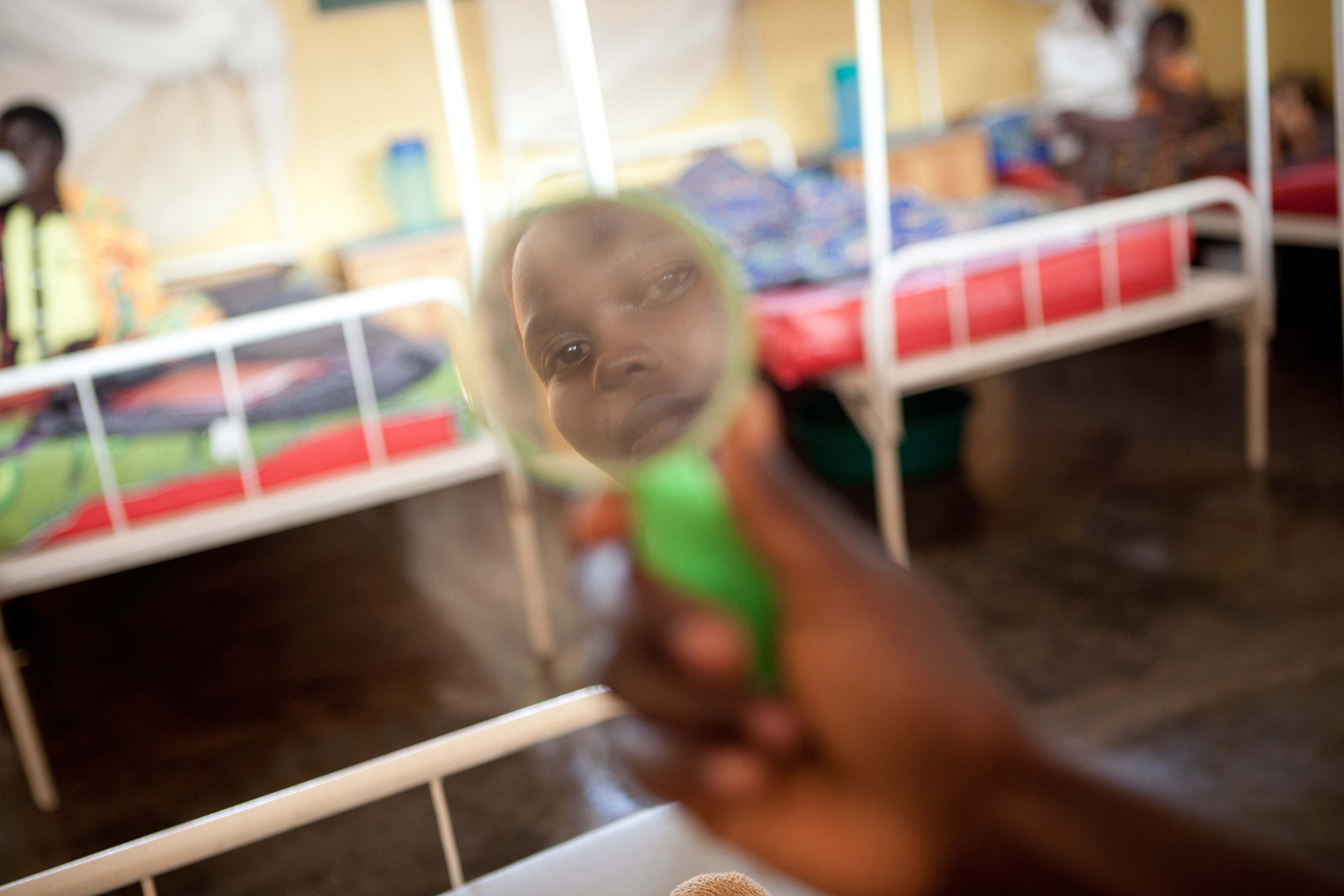

Dhaayo and Haldhaa*, both 17, were admitted to the first fistula camp MSF organized, in Galkayo South, Somalia, in November 2007.
They had become pregnant at 14, and when it came time to deliver, they went through days of excruciating labor at home. In the end, their babies arrived stillborn. In one way, they were fortunate: they survived while most girls and women who experience prolonged obstructed labor with no skilled assistance will die due to uterine rupture. If the mother continues to have contractions while the baby’s head is unable to descend into the birth canal, the womb can tear and the baby will be expelled into the abdominal cavity. The mother dies of blood loss from the torn uterus, and the baby dies as well.
This did not happen to Dhaayo and Haldhaa. They lived. But they soon noticed that they were no longer able to control their bladders, that they were “leaking” urine and feces involuntarily. The price they had paid for survival was an obstetric fistula.
An obstetric fistula is an opening between the vagina and the bladder that occurs during prolonged obstructed labor. As the hours pass and labor continues, the baby’s skull presses the connective tissue between the vagina and the bladder against the pelvic bones. If this goes on for a while, the tissue can die and a hole can develop between the vagina and the bladder—a vesico-vaginal fistula. It can also happen to tissue between the vagina and the rectum, causing a recto-vaginal fistula. When this happens the woman will lose stool through her vagina.
According to the best available data, 50,000 to 100,000 women develop fistulas every year, and at least two million women and girls are suffering from fistulas at any given time.i (It’s widely believed that these numbers are significantly lower than the reality). Most women develop fistulas young, many in their teens.ii And while not immediately life-threatening, fistulas bring profound consequences.
Women living with a fistula
are frequently relegated to life as an outcast.
Women living with a fistula are frequently relegated to life as an outcast. A husband will turn his wife out of the house, parents will refuse to help her, and co-wives or neighbors will ridicule and ostracize her. In places where a woman’s life is entirely dependent on being part of a family, expulsion can make survival extraordinarily difficult. If she doesn’t find help, she will bear this burden for the rest of her life, and help in many places is unavailable.
In 2007, MSF began running “fistula camps” to provide specialized fistula repair surgery in places where the needs were most evident. The camps last around six weeks. The first phase involves getting out the word in the communities, letting people—especially women with fistulas—know they are happening and what they involve. An advance team then sets up tents with 40 to 80 beds near a functioning hospital and hires additional staff to assist.
Once the preparations have been made, a fistula surgeon arrives and spends the next month or so operating on several women each day. Once recovered, these women are led through exercises designed to help them regain control over muscles that had been rendered all but useless by the fistula.
In Galkayo, a remote, undeveloped part of a long-troubled country, we had worked with community health educators and medical staff at small health centers to spread a very basic message: “if you leak urine, you can be cured; come to the MSF fistula camp.” We made announcements on radio stations as well, to get the word out even more widely. In all cases, we said that women must bring a caretaker, that they would have to follow the strict instructions given during the camp, and that success was not 100 percent guaranteed.
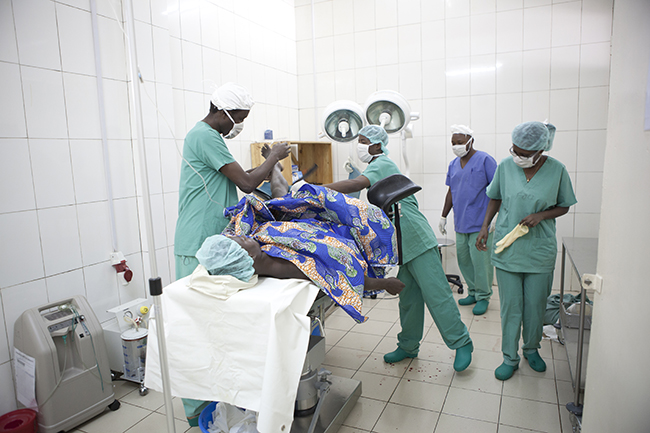
Evelyne receives fistula repair surgery at MSF’s project in Gitega, Burundi. Photo by by Martina Bacigalupo
When we opened the door, 25 women with fistulas showed up. They sat silently on their beds, their heads and faces covered by their niqabs and veils in the stifling heat. They were hesitant, uncertain, likely worn down and possibly depressed by their experience of living with a fistula.
A few weeks later, most of the women had been operated on and had started recovery. I vividly remember the dramatic change in atmosphere. These women were now laughing, making jokes, encouraging each other. They were exhilarated. Fistula surgery meant having a second chance at life.
It’s something I’ve seen many times since. In 2008, MSF organized a fistula camp in Dubié, South Kivu Province, in Democratic Republic of Congo (DRC). Among those who came were Michèle, 16, and Josine, 19. They had similar stories: early pregnancy, three days of obstructed labor at home, far from the closest available medical facilities. Their babies had died and they had both developed fistulas. Soon after, their husbands spurned them.
“When I went into labor, I went to the closest health center. There, they told me that I needed to wait, that I wasn’t yet ready to give birth.
I waited an entire day and then my water broke. They had me up on a gynecological table, but unfortunately, the nurse wasn’t there. My caretaker went to find her and tell her to come and see me. She came and found the baby’s head breaching. She didn’t do much to help—she couldn’t really, because it was already too late.
They referred me to a hospital, and we went there on a motorcycle, the baby’s head still breaching. They told us that they didn’t have the proper supplies and equipment to deal with the situation, so they referred us to another hospital. Again we went. There they examined me and told me that the baby had died.
They tried to remove the baby by pushing on my belly, but that did not work. They had to do an episiotomy and use forceps and a ventouse to remove the baby. They gave the body to my husband. He went to find a place for the burial. Since then, my husband hasn’t come to see me.
I was leaking urine, so once I arrived back home, I went to the local health center. There they told me that they couldn’t do anything about such a problem. They called for an ambulance to come and take me to Mukenge hospital. The ambulance came, but when I got to Mukenge, they said they couldn’t treat this problem either. We should call MSF in Gitega, they said, because their Urumuri health center has the capacity to deal with it.
They called the Urumuri center and I spoke to someone there. She said go get a ticket for transport, come to Gitega and we will reimburse you. It wasn’t easy to get the money together—my father had to rent a small piece of his land.
I got a warm welcome at the Urumuri center. Now I’m waiting to see what happens, whether I’ll need surgery or if the fistula will heal on its own. I feel good here, aside from having this problem. I am able to walk, even if I have pains in my right leg. I get along with the other women here; we are all suffering from the same thing and we can talk about it together.”
Deeply ashamed, Michèle returned to the home of her parents, who reluctantly took her back in, while Josine did likewise and gradually withdrew from the life she had led. “I used to work in the fields and I had friends,” she told me. “But as soon as I realized that I had a fistula, I distanced myself from my community out of shame—because of being wet all the time and the smell I was spreading.”
In all likelihood, Michèle, Josine, Dhaayo and Haldhaa experienced obstructed labor—and then fistulas—because they were young and their pelvises were too small for their children to pass through. It’s often said that fistulas can result from early pregnancy or early marriage, but it’s not that simple.
In the U.S., for instance, 305,420 babies were born to girls and young women 15 to 19 years old in 2012iii but there have been very few fistulas for a long time.iv Early pregnancy is a cause for concern everywhere around the world, but fistulas occur in developing countries because of the lack of access to emergency obstetric care. Even where fistula repair surgery is available, there needs to be more fistula prevention, which is to say more access to emergency care, to skilled birth attendants, and to properly outfitted medical facilities.
That remains MSF’s top priority when it comes to the health of pregnant and delivering girls and young women. Fistula repair projects can achieve wonderful things, but they should always complement obstetric care programs, not serve as a stand-in for them.
Women with a fistula often end up in a downward spiral.
Many can support themselves only as sex workers
and are continuously exposed to sexually transmitted infections,
including HIV.
Fistulas continue to be a hidden problem, relegated to the shadows, affecting women in societies that see them as subordinate and where those who endure them are stigmatized and shrouded in shame.
The price of silence is high, even if some of the affects are not immediately evident. Women with fistulas frequently drink as little as possible in order to leak as little urine as they can, but as the urine becomes more concentrated, it smells stronger. What’s more, not drinking can lead to chronic bladder, kidney and skin infections, and bladder stones. And over time, the vagina may become shorter, narrower and less flexible, hampering a woman’s ability to have sex and lessening the possibility of surgical repair.
Women with a fistula often end up in a downward spiral. Many can support themselves only as sex workers and are continuously exposed to sexually transmitted infections, including HIV, which heightens their vulnerability and lessens their chances of being cured.
If a woman already has children, or gets the fistula when she’s older, or has the support of the people around her, she may have a better chance of remaining connected to her community. But the best protection against the consequences of having a fistula is early repair. In the best case, that would be within months of its occurrence.
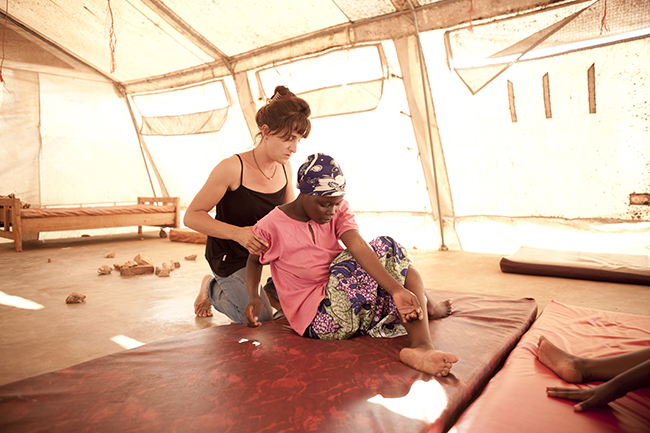
An MSF physiotherapist in Gitega, Burundi, works with Sandrine, 17, to help her build up enough muscle strength to undergo fistula repair surgery. She sustained a fistula, as well as nerve damage and other complications, due to a poorly performed episiotomy at another health facility. Photo by Martina Bacigalupo
During a visit to the fistula repair department at Mohammed Murtala Hospital in Kano, Nigeria, in 2006, I met 35-year-old Azalee. She had been living with a fistula for 12 years. Unable to find a job, she’d been forced to earn her living as a sex worker. She was now suffering from all the complications mentioned above. I still remember how devastated she was when she was told that it was too late for her to be repaired.
There are fistula repair centers in larger African cities like Kano and Katsina in Nigeria, Bamako in Mali, and Addis Ababa in Ethiopia. Some are well-known. However, doctors trained in doing fistula repairs in these countries tend to be concentrated in capital cities, along with relatively accessible obstetric facilities. Their services remain out of reach for women in rural areas.
“Not long ago, I was pregnant with my first child. I started experiencing pains in my abdomen, so I asked someone to accompany me to the nearest health center, which is two hours away on foot.
When I arrived at the health center, they told me that despite the pains, it wasn’t yet time for me to give birth. I waited two days and the baby still wasn’t coming, so they transferred me to the Kirundo hospital. They examined me at the hospital and found that the baby had died.
It was really hard when I lost the baby. What’s more is that I could have died too. I had an infection in my abdomen after the Caesarean section they gave me. I had to return to the hospital for the doctors to re-open the incision and clean out the inside. I spent another month at the hospital before I could go home.
People from my village kept asking what was wrong with me, why I was leaking urine all the time. I couldn’t tell them what the problem was because I didn’t know. So I just stayed at home, sad—I didn’t leave the house. I didn’t talk about it to anyone, except a community health worker who came to visit the village.
When I told her my story, we went to the closest health center. There, I was told that what I had was a fistula, and that I could get this problem treated in Gitega [at MSF’s Urumuri center]. I explained all this to my family, and we got together some money to pay the price of transport.
When I arrived here, I felt very well taken care of. I was given what I’d need and was shown where I would sleep. I still leak urine because I haven’t had the procedure to fix it yet. But I’m waiting for the operation and I believe that it will work.
I feel good now, and I’m no longer unhappy. There’s a really good atmosphere here. My husband comes to see me here often. My family and members of my church come to visit too.
To aid the healing process after the operation, there are recommendations that patients are supposed to follow, like refraining from sexual relations for three months. They seem a bit difficult. I agree with all of them but I don’t know if my husband will accept them. I don’t really know what I’ll do if that’s the case.
In order to stop this sort of thing happening to other women, I think they should avoid having children too young. I think they should study first, and then have kids. I wasn’t able to go to school when I was young, but if I had, I would have continued my studies and probably would not have become pregnant so soon in life. I hope my children will all go to school and become nuns and priests, or health care workers.”
When sexual and reproductive health became a priority for MSF in the late 1990s, and its antenatal and obstetric services were expanding—particularly in conflict-ridden places like Sierra Leone, Liberia, DRC, South Sudan, and Somalia—fistulas gradually emerged as a serious reproductive health problem.
We could see that a great need was being covered only marginally, often with poor quality care, so I worked with Dr. Kees Waaldijk, the world’s most experienced fistula surgeon, to organize a training program for MSF gynecologists and surgeons.
Dr. Waaldijk, a Dutchman, has been doing fistula repair surgeries in Nigeria for more than 25 years. With his help we established a small pool of MSF doctors who were well-trained in fistula repair, which we augmented by hiring specially trained surgeons from a Geneva-based association of Swiss urologists.
In 2007, when MSF began providing fistula care, teams carried out 195 operations. By 2011, the number had risen to 1,036, or almost seven percent of the repairs reported worldwide. In 2013, MSF provided 1,032 fistula repair surgeries. It’s been heartening to be able to help more women, but we’re always mindful of the fact that this is only a fraction of the new cases that develop each year.
There are only a few places in the world where
high-quality fistula repair training is provided
and space in these programs is limited.
Fistula care is much more than just mending the hole. It requires raising awareness, prevention, surgery, a caring attitude from the staff, and the patient’s involvement.
There are only a few places in the world where high-quality fistula repair training is provided and space in these programs is limited. For MSF, it is not a one-off training; staff alternate between time spent training and time in the field. Most MSF doctors trained in fistula surgery have returned to Nigeria three or four times to complete their training with Dr. Waaldijk. Now they can be considered trainers themselves; they can continue to use their skills to assist women in need while also preparing others to do the same.
It’s been difficult to train surgeons in the countries where MSF runs programs, however. Potential candidates might have other interests or they might have been assigned to other programs by their ministries of health. And fistula surgery is not easy. A lot of tissue loss can occur as a consequence of obstetric trauma, leaving less material to work with. Most fistulas are operated on through the vagina. Therefore, the handling of instruments can be difficult, because the operation field is limited and deep at the same time. An unsuccessful attempt to repair can result in additional scarring of the tissue, making things worse for the patient. The tissue can lose elasticity and become less usable for closure or reconstruction when another repair is attempted.
What’s more, success over the long term is only likely if the patient is actively involved in her healing. Fistula pre- and postoperative care is not complex but patients must faithfully adhere to a few basic instructions: drink four to six liters of fluids per day, remain mobile at all times and do the exercises they learn, leave the urinary catheters in place, and avoid sex for four to six months after the operation. (Fistula patients are advised not to get pregnant within a year after repair, and advised that any future deliveries should be by Caesarean section.)
Preferably, staff on the fistula ward have professional nursing or midwifery diplomas, but it is equally important that they are caring, pragmatic, and disciplined. They must be able to motivate patients to take part in their own healing.
The change in atmosphere at our first fistula camp in South Galkayo resulted partly from the women’s great relief at seeing an end to their suffering. But it was also an indication of how motivated the staff was. They created an atmosphere that made the patients see they were not alone, encouraging them to bond with their peers, bolstering their confidence, helping them find the courage to heal and then re-enter the society that had shunned them.
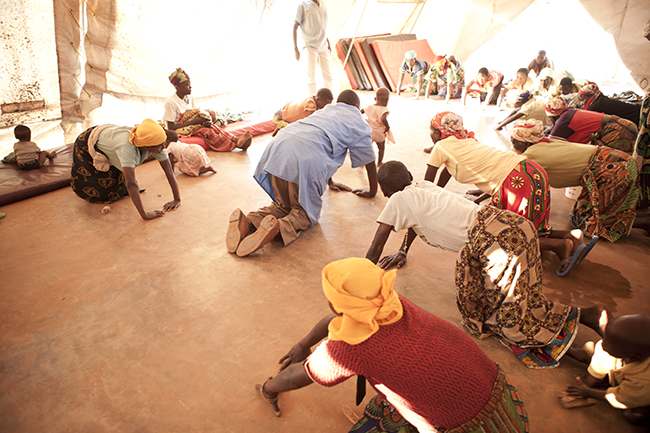
An MSF physiotherapist conducts a daily session with women who have gone through fistula repair surgery and now must faithfully perform strengthening exercises to help in their recovery. Photo by Martina Bacigalupo
At a fistula program in Mali, I worked with a woman named Zeynabou. She was petite but too loud, too cheerful, and too radiant to be overlooked. I might have guessed she was about 45, but she was only 28.
She’d been a patient before she was a colleague. Pregnant at 13, she delivered a stillborn child after a lengthy, difficult labor and developed a fistula that went unattended for several years. Six more pregnancies all ended the same way, and she became an outcast in her community, miserable, isolated, unsure of her future.
Then she visited an MSF fistula camp, where her fistula was successfully repaired. Her life changed almost immediately, and she became the buoyant, confident, optimistic woman she is today. Wisely, MSF asked her to become the outreach ambassador for its fistula program, a post reserved for a former patient who is well-suited to the task of raising awareness about fistula prevention and repair.
In addition, she serves as the maman village, or hostess, of the fistula compound. She greets newly admitted patients and walks them through the routines of the camp, putting them at ease, encouraging them, and communicating to them why it’s so important that they comply with the instructions they’re given.
She performed her roles very well, serving as an excellent example to the new patients—a living illustration of what was possible for them. When I had to leave the project, she told me almost everything was fine again in her life except she didn’t have children and a husband yet, so she proposed to me!
In some places, MSF runs one or two fistula camps per year. In others, it offers repair surgery as part of regular medical services. Both approaches use a well-established secondary-level obstetric facility as a point of departure—an acknowledgement that fistulas, as well as uterine rupture, are consequences of shortcomings with regard to emergency obstetric care.
The approach we take is chosen based on the circumstances: a camp may be the better choice if fistula surgeons are only available for a limited amount of time, if relatively few patients come because of insecurity and conflict, or because of particularly strong social stigma.
“I have been pregnant nine times, but I gave birth for the first time last Friday. My first pregnancy was in the year 2000. I was in labor for a long time, and there was a lot of confusion and chaos. I was supposed to give birth naturally, but in the end, the baby died. Since then, I’ve had incontinence [the result of an obstetric fistula] and I have been unable to carry a child to term. It was terrible not to be able to have a baby. It was a desperate feeling. I saw a number of doctors to try to have the fistula repaired. Eventually I was able to have fistula repair surgery during a campaign.
My latest pregnancy was fine, but my water broke five days ago, at 29 weeks. When I felt it happen, I immediately started to cry. My first thought was that the baby is going to die. That’s what happened last time and I lost my child.
I went to the health center near me in Mutambo when it happened, and I told them how many miscarriages I’ve had. They said to wait there and called the ambulance from MSF’s center in Kabezi to come and get me. When I arrived at the facility, they operated on me right away. They gave me a C-section. I was desperate. All I wanted to do was to see my baby, to make sure he was still alive. When he was born, he was so tiny. He weighed so little. Every day he seems to get better, which gives me hope. The doctors, too, give me hope that he’ll live.
The local health centers around here don’t seem to have the necessary resources to take care of women in labor. I get the impression that most of them call out to the Kabezi health center for an ambulance to come and pick the women up, which can obviously take time. And what about the urgent cases?
I have to thank my husband for sticking with me and having supported me in all this. He has been with me during all these miscarriages. He has been with me even when I was leaking urine. He’s helped me to go get care when I needed it in Bujumbura. He’s never left me, despite the fact that plenty of people in our circle have told him to.
I am so, so happy to be a mother. There really aren’t any words. To be a parent, it’s an immense pleasure that I can’t even describe. Since my baby was born I’ve felt my mood lift.”
Working in a conflict zone may require projects to produce smaller footprints as well. I remember being in Somalia in 2007 when we had to quickly dismantle a fistula camp in Marere and move it—including patients, tents, water tanks, surgical equipment and staff—to Kismayo.
Another major challenge is patient follow-up, which is crucial because repaired fistulas take time to fully heal. The restored anatomy is fragile; a fresh fistula repair can easily break down during the first months after surgery, especially if sexual activity is resumed too soon.
There are two common reasons why patients don’t appear for follow-up appointments: either they are fully cured and don’t feel they need to come back, especially if they live in an insecure area or far from the facility; or they are dissatisfied with the result because they continue to leak. If a woman needs further care but can’t or doesn’t return for follow-up, there’s not much we can do to help her, alas. We also cannot properly assess our own effectiveness in her case.
Overall, however, MSF’s experience has been positive. Word has spread in the places where we work and hundreds of women come to MSF to get treatment every year. There are also a handful of other medical humanitarian organizations active in under-resourced areas. I know that suffering has been alleviated.
The need is still great, unfortunately, and only a fraction of the women who need surgery receive it. To prevent tens of thousands more women from experiencing fistulas every year and to help the roughly three million women now living with fistulas, much work remains. And most of that work should happen before the fistulas ever occur, starting with a concerted effort to provide access to emergency obstetric services to more women, wherever they live.
*Patient names have been changed.
iWorld Health Organization. “10 facts on obstetric fistula”. 2014; http://www.who.int/features/factfiles/obstetric_fistula/en/
iiWHO, Department of Making Pregnancy Safer, Obstetric Fistula: Guiding principles for clinical management and programme development, p. 6 & 7. 2006. http://whqlibdoc.who.int/publications/2006/9241593679_eng.pdf
iiiMartin, Joyce A., MPH, et al., Births: Final Data for 2012, National Vital Statistics Reports, Vol. 62, No. 9, p. 5. CDC, December 2013; http://www.cdc.gov/nchs/data/nvsr/nvsr62/nvsr62_09.pdf
ivThe Society of Obstetricians and Gynaecologists of Canada, A Labour of Loss : Obstetric Fistula. Accessed December 2014. http://iwhp.sogc.org/index.php?page=obstetric-fistula



